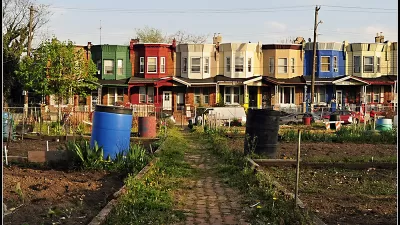In rising to meet America's changing housing needs and demands, not every community is positioned to pull it off. What to do? Painful though it is, Ben Brown suggests triage.
"The good news about making the redevelopment of American neighborhoods more responsive to 21st century American needs is that we seem to have a pretty good grasp on the problem:
"We have a lot more isolated, supersized, energy-sucking housing than we want or can afford. And we have a lot less compact, close-in, energy-efficient neighborhoods than we need. The data is in, reported and summarized in a bunch of different places, including PlaceShakers posts here and here."
"The bad news is how tough it is to turn around a half-century of misplaced investment and start delivering the sort of housing choices America’s changing demographics and economic realism demand. The fact is, we’re addicted to housing policies and processes that are sapping our wellbeing and future prosperity. And to make rehabilitation even more challenging, we’ve organized whole industries around supporting and prolonging the addiction."
Ben Brown goes on to report the goings-on this week at the New Partners for Smart Growth conference in Kansas City. And the conversations and efforts happening to effect change in the housing market.
FULL STORY: The Data is In: Let the heavy lifting begin

Trump Administration Could Effectively End Housing Voucher Program
Federal officials are eyeing major cuts to the Section 8 program that helps millions of low-income households pay rent.

Planetizen Federal Action Tracker
A weekly monitor of how Trump’s orders and actions are impacting planners and planning in America.

Ken Jennings Launches Transit Web Series
The Jeopardy champ wants you to ride public transit.

Milwaukee Road to Get Complete Streets Upgrades
The city will reduce vehicle lanes and build a protected multi-use trail including bioswales and other water retention features on its ‘secret highway.’

Tackling Soil Contamination With Nature-Based Solutions
Los Angeles County residents and experts are turning to nature-based methods like bioremediation to address long-standing and fire-exacerbated soil contamination without resorting to costly and disruptive removal.

Rebuilding Smarter: How LA County Is Guiding Fire-Ravaged Communities Toward Resilience
Los Angeles County is leading a coordinated effort to help fire-impacted communities rebuild with resilience by providing recovery resources, promoting fire-wise design, and aligning reconstruction with broader sustainability and climate goals.
Urban Design for Planners 1: Software Tools
This six-course series explores essential urban design concepts using open source software and equips planners with the tools they need to participate fully in the urban design process.
Planning for Universal Design
Learn the tools for implementing Universal Design in planning regulations.
Ada County Highway District
Clanton & Associates, Inc.
Jessamine County Fiscal Court
Institute for Housing and Urban Development Studies (IHS)
City of Grandview
Harvard GSD Executive Education
Toledo-Lucas County Plan Commissions
Salt Lake City
NYU Wagner Graduate School of Public Service



























